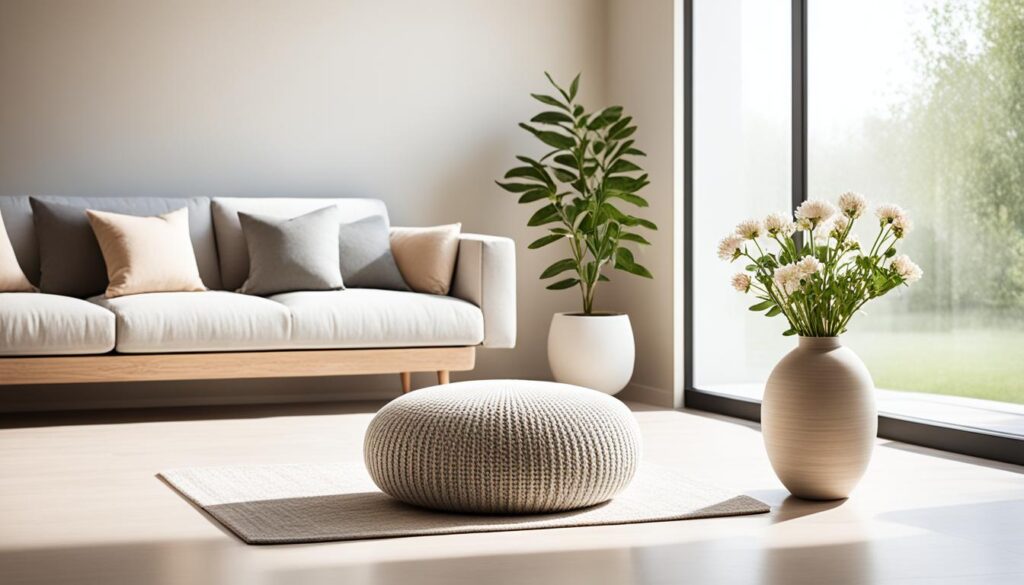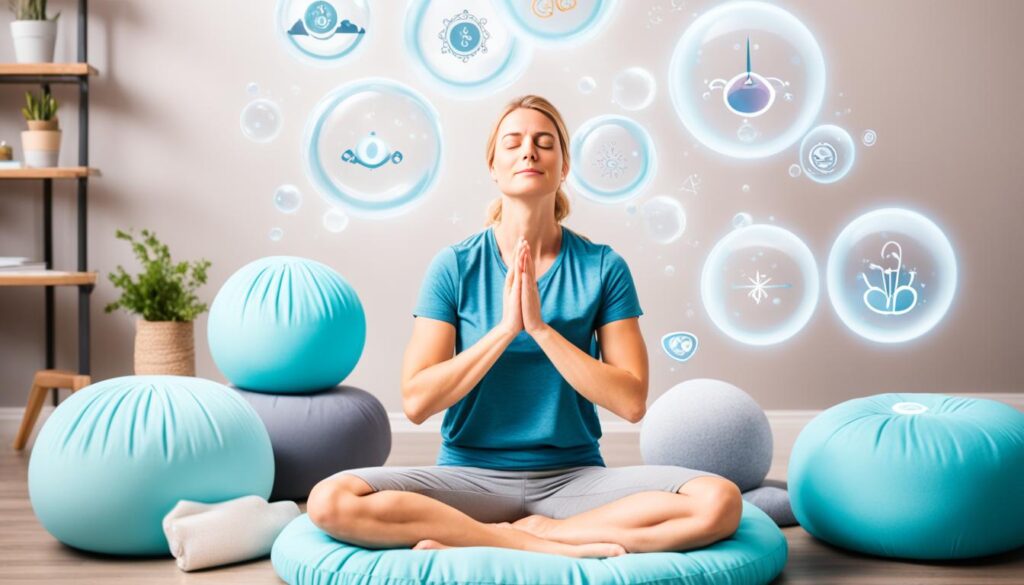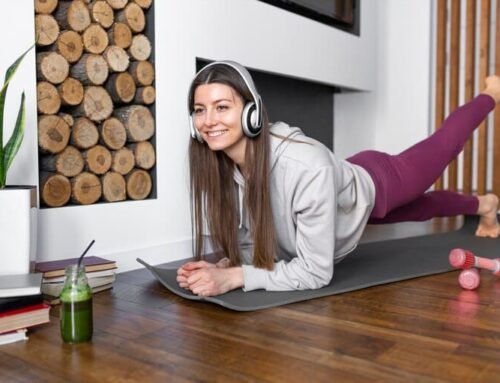Meditation is a powerful way to boost your health and happiness. By adding mindfulness and meditation to your daily life, you can lower stress and improve focus. It also helps you find peace and build emotional and physical strength.
This article will cover the different types of meditation and their benefits. You’ll also find tips to make meditation a regular part of your life.
Key Takeaways :Meditation Techniques
- Meditation is a technique that involves focused attention and present moment awareness to promote physical and psychological well-being.
- Regular meditation practice can help reduce stress, anxiety, and depression, while improving focus, concentration, and emotional regulation.
- There are various meditation techniques, including mindfulness meditation, guided meditation, and mantra meditation, that require different skills and mindsets.
- Establishing a consistent daily meditation practice, even for a few minutes, can significantly enhance the benefits of meditation.
- Creating a dedicated meditation space and overcoming common challenges can help support a sustainable meditation practice.
What is Meditation?
Meditation is a powerful way to train the mind for calm, clarity, and awareness. It’s all about focused attention. People learn to keep their minds on something simple, like their breath, to stay in the now.
Defining Meditation: A Practice of Focused Attention
By meditating, people grow in mindfulness and awareness. They learn to notice the present without getting caught up in thoughts or distractions. They focus on their breath to keep their minds sharp and attentive.
This focus on the breath helps them stay grounded in the moment. It builds a deeper understanding of themselves and brings peace. As they get better at focusing, they feel clearer and can handle life’s ups and downs with more ease and strength.
“Meditation is the dissolution of thoughts in Eternal awareness or Pure consciousness.” – Swami Sivananda
Benefits of Meditation

Meditation is a powerful practice that helps both your emotional and physical health. It can reduce stress levels, making you feel calmer and more relaxed. It also improves focus and attention, boosts your emotional intelligence, and brings more inner peace and happiness.
Meditation is good for your body too. It can boost the immune system, improve sleep quality, and reduce symptoms of certain medical conditions. It helps you connect with the present, leading to a deep sense of well-being and mindfulness in all life areas.
| Benefit | Description |
|---|---|
| Stress Reduction | Meditation lowers cortisol levels, the stress hormone, for more calm and relaxation. |
| Improved Focus and Attention | Regular meditation boosts your concentration, making you more productive and sharp. |
| Emotional Intelligence | Meditation grows self-awareness and emotional understanding, improving social skills. |
| Physical Health Benefits | Meditation is linked to better immune function, sleep, and easing some medical symptoms. |
Adding meditation to your daily life brings many psychological and physical benefits. These can greatly improve your health and happiness.
Meditation Techniques

Exploring meditation shows us many techniques, each with its own benefits and ways to find peace. From mindfulness meditation‘s focus to mantra meditation‘s soothing sounds, there’s something for everyone.
Guided meditation lets you follow a teacher or recording, making it easy for beginners. Body scan meditation takes you deep into your body, helping you know yourself better.
For those who like combining mind and body, yoga, qigong, and tai chi are great. They mix movement, breath, and meditation for a balanced state.
If you like visualizing or walking, meditation has many options. You can find the perfect technique that fits your needs and likes.
| Meditation Technique | Description |
|---|---|
| Mindfulness Meditation | Focuses on present moment awareness and the observation of thoughts, emotions, and sensations without judgment. |
| Guided Meditation | Follows the instructions of a teacher or audio recording, providing a structured and supportive experience. |
| Mantra Meditation | Involves the repetition of a word, phrase, or sound to anchor the mind and promote inner calm. |
| Body Scan Meditation | Directs attention to different parts of the body, cultivating a deeper understanding of physical sensations. |
| Visualization Meditation | Encourages the creation of mental imagery, often used to reduce stress and promote a sense of well-being. |
| Walking Meditation | Combines mindful movement with present moment awareness, providing a meditative experience in motion. |
| Yoga, Qigong, Tai Chi | Integrative practices that blend movement, breath, and meditation, promoting physical, mental, and spiritual well-being. |
Meditation is versatile, offering many techniques for different needs and likes. By trying these practices, you can find the one that best fits your path to better health and peace.
Mindfulness Meditation

Mindfulness meditation is a powerful way to stay in the present moment. It helps you see your thoughts and feelings without judgment. By focusing on your breath, you can become more aware of yourself. This can lead to better control over your emotions and less stress.
This practice is about gently bringing your focus back to your breath when your mind drifts off. It teaches you to watch your thoughts and feelings without getting lost in them. Over time, you’ll understand yourself better and stay more connected to the now.
“Mindfulness is the aware, balanced acceptance of the present experience. It isn’t more complicated than that. It is opening to or receiving the present moment, pleasant or unpleasant, just as it is, without either clinging to it or rejecting it.” – Sylvia Boorstein
Through mindfulness meditation, you can handle life’s challenges better. You’ll think more clearly, be kinder to yourself, and manage your feelings better. This can help reduce stress, improve focus, and increase self-awareness and acceptance.
Whether you’re just starting or have been meditating for a while, adding mindfulness techniques to your day can change your life. By being open and curious about the present, you can find more peace, strength, and well-being within.
Guided Meditation

Guided meditation is a great way to relax and focus. It means listening to an instructor or audio recording that guides you. They lead you through different visualizations, body scans, and breathwork exercises. This helps you use your senses and focus on the present moment. It brings deep mental imagery and inner peace.
Guided meditation is perfect for beginners or those who find it hard to meditate alone. The instructor keeps you on track and stops your mind from drifting. You can listen to audio recordings anytime, making it easy to fit into your day.
If you’re new to meditation or want to deepen your practice, guided meditation is a great choice. It can improve your health and happiness. By being more aware of the present moment and clear in your thoughts, you can experience its many benefits.
| Guided Meditation | Self-Guided Meditation |
|---|---|
| Follows instructions from an instructor or audio recording | Practitioner guides themselves through the meditation process |
| Provides a structured framework for beginners or those who struggle with focus | Requires more self-discipline and experience to maintain concentration |
| Helps to cultivate relaxation, focus, and present moment awareness | Allows for more personalization and exploration of individual meditation styles |
Establishing a Daily Practice

Starting a daily meditation practice is key to its benefits. By making meditation a part of your daily life, you can improve focus, calmness, and resilience. Begin by setting aside a few minutes each day and promise yourself to stick with it.
Consistency is Key
Being consistent with meditation is crucial. The more you meditate, the better it will make you feel. Try to make meditation a habit by adding it to your schedule or linking it with another daily task.
Here are some tips to stay consistent:
- Choose a specific time and place for your daily meditation
- Use reminders or alarms to remember your practice
- Make meditation something you look forward to
- Keep going, even when it’s hard
Cultivating Commitment
Sticking with a daily meditation practice takes discipline and determination. Remember, meditation helps with focus, stress, happiness, and emotional strength. Stay with it, and you’ll see the benefits grow over time.
Here’s how to stay committed:
- Set realistic goals for your meditation
- Keep track of your progress and celebrate your wins
- Find ways to enjoy and reward your practice
- Get support from friends, family, or a meditation group
With consistency and commitment, daily meditation can change your life, one mindful moment at a time.
Creating a Meditation Space

Creating a special spot for meditation at home can boost your practice and experience. The setting you choose affects how well you can focus, relax, and find peace during meditation.
When picking a place for your meditation space, find a quiet, comfy spot away from distractions. It could be a corner, a separate room, or a small nook. Make sure it’s clean, bright, and welcoming, with little clutter to reduce distractions.
To make it your own, think about adding personal touches. This could be calming art, candles, or meditation cushions. These things help make the space feel cozy and relaxing, letting you dive deep into your meditation practice.
- Choose a quiet, distraction-free location
- Ensure the space is clean, well-lit, and inviting
- Add personal touches to create a sense of comfort and focus
- Incorporate meditation accessories like cushions or candles
By making a meditation-friendly environment, you create a space that supports your practice. It helps you reach deeper states of relaxation and focus.
Overcoming Common Challenges

Meditation is a powerful practice, but it has its challenges. Even those who meditate a lot can struggle with mind wandering, restlessness, and boredom. It’s hard to keep up with consistency because of distractions and other things we need to do.
Don’t let self-judgment get the best of you. It’s important to be patient and kind to yourself. Remember, meditation isn’t about being perfect. It’s about learning to be aware and accept what’s happening right now, no matter what.
Here are some tips and strategies to help you with meditation challenges:
- When your mind wanders, bring your focus back to your breath.
- Add movement or visualization to fight restlessness or boredom.
- Slowly make your meditation sessions longer to get better at consistency and patience.
- Remember, each meditation is different. There’s no one right way to do it.
| Challenge | Strategy |
|---|---|
| Mind Wandering | Refocus on the breath |
| Restlessness | Incorporate movement or visualization |
| Boredom | Vary meditation techniques |
| Consistency | Gradually increase practice duration |
The secret to beating these challenges of meditation is to keep coming back, every day, with an open mind. By accepting the good and the bad, you’ll find the deep rewards of this journey.
Meditation and Mindfulness in Daily Life

Adding mindfulness in daily life and meditation to your daily routine can change more than just your meditation time. It helps you stay focused, calm, and more aware of your feelings. This can make your daily tasks, relationships, and choices better.
Mindfulness can cut down on stress, boost productivity, and help you connect with others better. Always look for chances to pause, breathe deeply, and focus on the now. Whether you’re on your way to work, at your desk, or with family, adding these practices to your life makes you live more intentionally and happily.
- Make meditation a part of your daily life, even if it’s just for a few minutes.
- Stay in the present moment all day, like when you’re walking, eating, or talking with others.
- Use mindfulness to improve focus and productivity at work or school.
- Work on emotional intelligence by paying attention to your feelings and those of others.
- Put self-care first with activities that help you reduce stress and keep your life balanced meditator.
By making mindfulness and meditation a part of your daily life, you can find a deeper sense of focus, calm, and connection. This can improve every part of your well-being best meditation progressive relaxation.
“Mindfulness is the basic human ability to be fully present, aware of where we are and what we’re doing, and not overly reactive or overwhelmed by what’s going on around us.” – Jon Kabat-Zinn
Also Read : What Is the Impact of Stress on Heart Health?
Conclusion
Meditation is a powerful tool that can greatly improve your health and well-being. By adding different meditation techniques to your daily life, you can lower stress, improve focus, and find inner peace. It also helps increase emotional and physical strength.
It doesn’t matter if you like mindfulness meditation, guided practices, or moving while you meditate. The important thing is to find a method that feels right for you. And then, stick with it regularly. This way, you’ll see the amazing changes meditation can bring into your life.
The summary of this article shows that meditation has many benefits. These include improved health, happiness, stress reduction, better focus, and more inner peace. To get the most out of meditation, make it a regular part of your day. Start using mindfulness in your daily activities. This powerful practice can lead you to a healthier and more joyful life.
FAQs
Q: What is meditation and why is it beneficial?
A: Meditation is a practice that involves focusing your attention to achieve mental clarity, emotional calmness, and a sense of inner peace. The benefits of meditation include reduced stress and anxiety, improved focus and concentration, enhanced self-awareness, and a greater sense of overall well-being.
Q: What are some common types of meditation?
A: Some common types of meditation include mindfulness meditation, loving-kindness meditation, mantra meditation, transcendental meditation, and movement meditation. Each type has its own unique techniques and benefits.
Q: How can beginners start meditating?
A: Beginners can start meditating by finding a quiet and comfortable place to sit or lie down, focusing on their breath or a mantra, and gradually increasing their meditation practice over time. There are many guided meditation resources available for beginners as well.
Q: What is transcendental meditation and how is it different from other forms of meditation?
A: Transcendental meditation is a specific form of meditation that involves silently repeating a mantra to transcend conscious thought and experience a state of pure awareness. It is different from other forms of meditation due to its unique technique and emphasis on personal transformation.
Q: How can meditation help with stress and anxiety?
A: Meditation can help with stress and anxiety by promoting relaxation, reducing the production of stress hormones, and increasing feelings of calmness and well-being. Regular meditation practice can also improve emotional resilience and coping skills.
Q: What are some visualization techniques used in meditation?
A: Visualization techniques involve mentally imagining a peaceful or positive scene to promote relaxation and focus. Visualization can be combined with breathing exercises or body scan meditations to enhance the overall meditation experience.
Q: How does loving-kindness meditation work and what are its benefits?
A: Loving-kindness meditation involves directing feelings of love and compassion towards oneself and others. This practice can cultivate feelings of empathy, gratitude, and emotional well-being, while promoting a sense of interconnectedness with others.
Source Links
- https://www.headspace.com/meditation/happiness
- https://www.mindful.org/how-to-meditate/
- https://www.mayoclinic.org/tests-procedures/meditation/in-depth/meditation/art-20045858








Leave A Comment